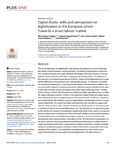Mostrar o rexistro simple do ítem
Digital Divide, Skills and Perceptions on Digitalisation in the European Union—Towards a Smart Labour Market
| dc.contributor.author | Vasilescu, Maria Denisa | |
| dc.contributor.author | Serban, Andreea Claudia | |
| dc.contributor.author | Dimian, Gina Cristina | |
| dc.contributor.author | Aceleanu, Mirela Ionela | |
| dc.contributor.author | Picatoste, Xosé | |
| dc.date.accessioned | 2020-05-11T08:53:34Z | |
| dc.date.available | 2020-05-11T08:53:34Z | |
| dc.date.issued | 2020 | |
| dc.identifier.citation | Vasilescu MD, Serban AC, Dimian GC, Aceleanu MI, Picatoste X (2020) Digital divide, skills and perceptions on digitalisation in the European Union—Towards a smart labour market. PLoS ONE 15(4): e0232032. https://doi.org/ 10.1371/journal.pone.0232032 | es_ES |
| dc.identifier.issn | 1932-6203 | |
| dc.identifier.uri | http://hdl.handle.net/2183/25535 | |
| dc.description.abstract | [Abstract] The new technologies, the digitalisation of processes and automation of work will change the manner of doing business, working and living. The effects of digitalisation on the economy, society and quality of life imply significant challenges of the labour market. All the participants will be concerned: authorities, companies and ordinary people. The objective of this research is to analyse the perceptions of the EU citizens about digitalisation and to highlight the differences among specific socio-demographic groups. The analysis is grounded on a composite methodology, comprising several statistical and econometric methods that provide scientific support to achieved conclusions: statistical analysis (with the primary goal to shed light on the EU citizens’ perceptions about their digital technology skills), TwoStep Cluster Analysis (TSCA) (with the purpose to identify the ‘digital vulnerable groups’ and then the ‘digital vulnerable countries’ in terms of the exposure to digital divide) and logistic regression (with the main aim to quantify the impact of the relevant factors on citizens’ perceptions about digitalisation). We identified a group of respondents evaluating themselves as having meagre digital skills, very afraid that robots could steal their jobs and with low usage of the internet. They are elderly, with a low level of education, manual workers or not working, with a relatively low level of income and little Internet use. The originality of our approach is given by the fact that we focused on investigating if digital divide leads to the creation of vulnerable groups (citizens and/or countries) and if there are specific patterns in terms of the perception on being skilled in the use of digital technologies in daily life or at work and of the understanding that robots replace human on the labour market. We aim to find relevant factors for the labour market to assume targeted measures that should be taken for a better match of supply and demand on the labour market and for creating a smart labour market. It is highly needed to increase the people’s confidence in their skills level and to make the most of digitalisation of the societies. The results show consistent patterns in term of socio-demographic characteristics and perception towards digitalisation. The latter will have a meaningful impact on the economy and the society in the European Union in the next period. That is why a positive attitude towards digitalisation is essential for transforming this relatively new challenge into an excellent opportunity for the future. | es_ES |
| dc.description.sponsorship | PNCDI III Program – Project “Understanding and modelling time-space patterns of psychology-related inequalities and polarization”, PN-III-P4-IDPCCF-2016-0084 | es_ES |
| dc.description.sponsorship | Rumanía. Unitatea Executiva Pentru Finantarea Invatamantului Superior a Cercetarii Dezvoltarii si Inovarii (UEFISCDI); PN-III-P4-ID-PCCF-2016-0084 | |
| dc.language.iso | eng | es_ES |
| dc.publisher | Public Library of Science | es_ES |
| dc.relation.uri | https://doi.org/10.1371/journal.pone.0232032 | es_ES |
| dc.rights | Attribution 4.0 International | es_ES |
| dc.rights.uri | http://creativecommons.org/licenses/by/4.0/ | |
| dc.subject | Robots | |
| dc.subject | Labor markets | |
| dc.subject | Jobs | |
| dc.subject | Artificial intelligence | |
| dc.subject | Internet | |
| dc.subject | Professions | |
| dc.subject | Psychological attitudes | |
| dc.subject | Automation | |
| dc.title | Digital Divide, Skills and Perceptions on Digitalisation in the European Union—Towards a Smart Labour Market | es_ES |
| dc.type | info:eu-repo/semantics/article | es_ES |
| dc.rights.access | info:eu-repo/semantics/openAccess | es_ES |
| UDC.journalTitle | PLoS ONE | es_ES |
| UDC.volume | 15 | es_ES |
| UDC.issue | 4 | es_ES |
| UDC.startPage | 1 | es_ES |
| UDC.endPage | 39 | es_ES |
Ficheiros no ítem
Este ítem aparece na(s) seguinte(s) colección(s)
-
GI-EDaSS - Artigos [29]






